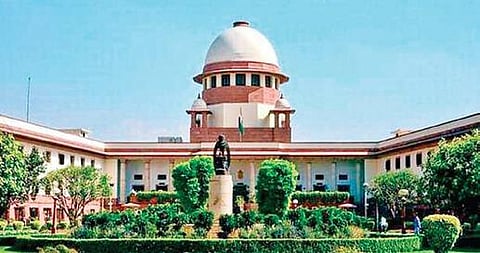

NEW DELHI: The Supreme Court on Thursday upheld the Madras High Court order declaring 10.5 percent internal reservation to the Vanniyar community as unconstitutional. The order comes on a cluster of petitions challenging the High Court order that quashed a Tamil Nadu quota law providing 10.5% special reservation to the Vanniyar community.
“...Finally, on the 2021 Act, we are of the opinion that there is no substantial basis for classifying the Vanniakula Kshatriyas into one group to be treated differentially from the remaining 115 communities within the MBCs and DNCs, and therefore, the 2021 Act is in violation of Articles 14, 15 and 16. We uphold the judgment of the High Court on this aspect.
Given our conclusion on the 2021 Act being ultra vires Articles 14, 15 and 16 of the Constitution, we have refrained from delving into the issue of non-compliance by the state government with the consultation requirement prescribed under clause (9) of Article 338-B at the time of enactment of the 2021 Act,” the Supreme Court order passed by a bench comprising Justice L. Nageswara Rao and Justice BR Gavai reads.
"We make it clear that the aforesaid observations do not prevent the state, if it so decides, from undertaking suitable exercises for collecting pertinent, contemporaneous data to determine how demands for internal reservation within the backward Classes can be justly addressed," it added.
“Representation of Vanniyars in public posts in the government of Tamil Nadu for the years 1980 to 1983, according to the Ambasankar Commission Report, was much better in comparison to persons belonging to the other communities within the MBCs and DNCs… Particulars provided of staff members in Anna University for the years 2018 to 2020, obtained under the RTI Act, appear to paint a picture of better access and representation of members of the Vanniyar community over their compatriots belonging to other communities within MBCs and DNCs…,” the order said.
The apex court said that they have referred to this data only to emphasise that the findings in the letter of Justice Thanikachalam had to be suitably supported by independent studies and assessment of relevant data.
The court has said that choosing a particular caste and providing a special reservation of 10.5 per cent out of the 20 per cent to the caste is discriminatory, in the absence of any sound differentiation from communities who are similarly situated and were, therefore, grouped together for the purposes of receiving the benefits of 20 per cent reservation.
“While the state government has the competence to classify the Vanniakula Kshatriyas or any other community or group of communities within backward classes as a particular class for the grant of special measures, there should be a reasonable basis for categorising such communities into a different section from the rest of the communities within the MBCs and DNCs, on grounds which cannot be superficial or illusory…
The justification on behalf of the state is that sufficient material was gathered by the Tamil Nadu Backward Classes Commission to show that there was inadequate representation, disproportionate to the population of the Vanniakula Kshatriyas, thereby culminating in the 2021 Act, which aimed to achieve equitable distribution of reservation amongst MBCs and DNCs.
A perusal of the discussion ….would disclose that the letter from the Chairman, Backward Classes Commission is on the basis of antiquated data, without any assessment of the relative backwardness and representation of the Vanniakula Kshatriyas and their ability to compete with the remaining 115 communities within the MBCs and DNCs.”
Political analyst Tharasu Shyam told TNIE that the SC had upheld the quashing of the 10.5 per cent reservation due to procedural flaws. As such, to remove them, the DMK government should form an experts committee to hold talks with all the 102 castes in the MBC category.
"The State government has powers to provide internal reservation to a section of the society. But in the case of reservation for Vanniyars, the way it was given is wrong. Just after the Madurai Bench of Madras High Court quashed the reservation for Vanniyars, the DMK government should have taken steps to remove the shortcomings pointed out by the court. Now, the SC has pointed out almost similar lacunae."